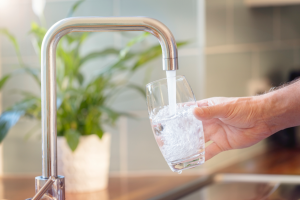What is Hard Water and Why Is It a Problem? A Lemont Water Conditioning Company Answers
 You may have heard of hard water. You might even know that it’s running through your pipes. However, do you actually know what it is?
You may have heard of hard water. You might even know that it’s running through your pipes. However, do you actually know what it is?
If not, and if you’re looking to learn about it, then you’re in the right place. Below, this Lemont water conditioning company is going to explain hard water in detail, discussing its primary characteristics as well as why it’s a problem.
What is Hard Water?
Simply put, hard water is water that contains excess amounts of calcium and magnesium. How does this calcium and magnesium make its way into water? By way of the soil.
When water is brought up from the ground, it brings the minerals in the soil along with it. As such, if there’s a great deal of calcium and magnesium in that portion of soil, the water that’s brought up from it will end up containing a great deal of calcium and magnesium as well.
Some areas of the country have harder water than do others. For instance, here in the United States, midwestern states tend to have harder water than northeastern states. As you might have guessed, this is because midwestern soil contains more calcium and magnesium than does northeastern soil.
Because Lemont is in the midwest, and in particular, northeastern Illinois (which has some of the hardest water in the region), the town is known to have hard water.
Why is Hard Water a Problem?
Now that you know what hard water is, you’re probably curious: why is hard water a problem? What difference does it make if there are excess amounts of calcium and magnesium in your water? We’ll explain below.
It Creates Mineral Buildup
One of the biggest problems with hard water is that it creates mineral buildup. As this water passes through water pipes and water-based appliances, the calcium and magnesium contained within it tend to cling to the interiors.
Over time, these calcium and magnesium particles can build up on top of one another, restricting the flow of water and ultimately resulting in functionality issues. Therefore, by removing calcium and magnesium from your water, you can avoid mineral buildup and prolong the life of your water-based appliances.
It Creates Skin and Hair Issues
Not only do calcium and magnesium build up on the interiors of water-based appliances, but on the skin and the hair as well. As you might expect, this too can have negative effects.
When calcium and magnesium cling to the skin, they clog skin pores, stopping the secretion of body oils. This leaves the skin dry and itchy, leading to problems like acne and eczema.
The same thing happens with your hair. The calcium and magnesium can stiffen up the hair, leading to split ends and other problems.
Reduces Soap Suds
Another negative effect of hard water is the reduction of soap suds. When there are excess amounts of calcium and magnesium in water, they disturb the chemical reaction between soap and water. As a result, very few soap suds are able to form.
This can make cleaning difficult, as soap suds are vital. By getting rid of calcium and magnesium, you’ll be able to clean more thoroughly. Installing a water softener will help.
Dealing with Hard Water in Lemont, Illinois?
Do you have hard water running through your home? Looking to eliminate it? If so, and if you’re looking for a water purification company in Lemont, IL, we here at Johnson Water Conditioning Company are the people to see.
We’ve installed water softeners in countless homes throughout the Lemont area. We can have your water purified in no time.
Contact us today to get the process started!

 Better Water for
a Better Life
Better Water for
a Better Life
